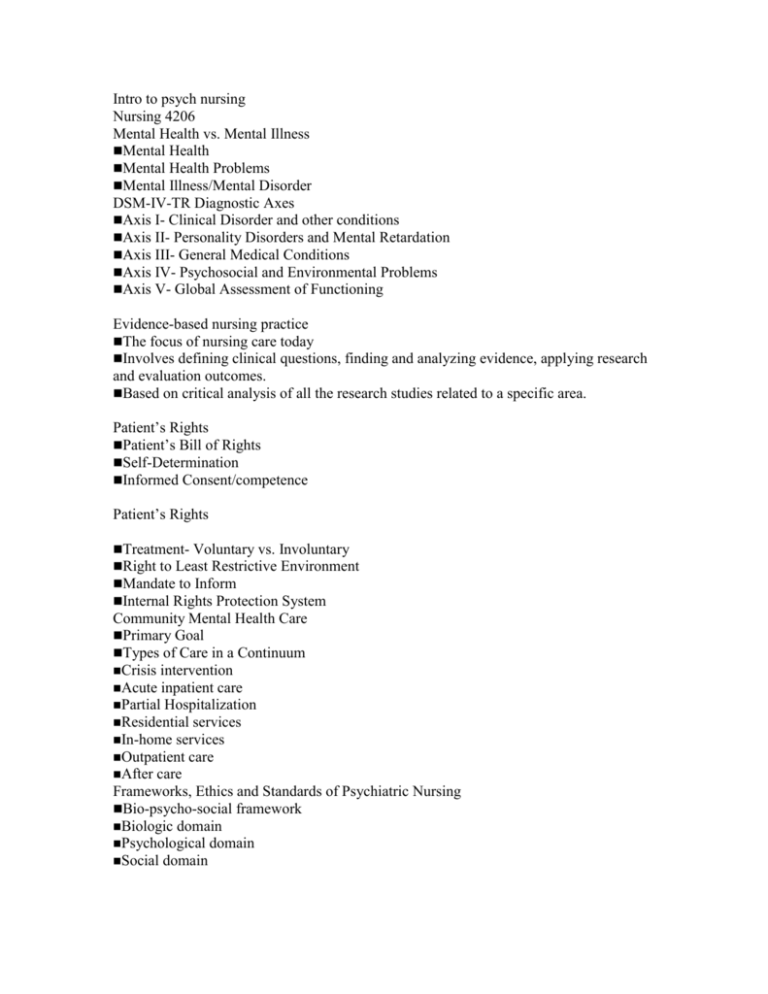Intro to psych nursing
advertisement

Intro to psych nursing Nursing 4206 Mental Health vs. Mental Illness Mental Health Mental Health Problems Mental Illness/Mental Disorder DSM-IV-TR Diagnostic Axes Axis I- Clinical Disorder and other conditions Axis II- Personality Disorders and Mental Retardation Axis III- General Medical Conditions Axis IV- Psychosocial and Environmental Problems Axis V- Global Assessment of Functioning Evidence-based nursing practice The focus of nursing care today Involves defining clinical questions, finding and analyzing evidence, applying research and evaluation outcomes. Based on critical analysis of all the research studies related to a specific area. Patient’s Rights Patient’s Bill of Rights Self-Determination Informed Consent/competence Patient’s Rights Treatment- Voluntary vs. Involuntary Right to Least Restrictive Environment Mandate to Inform Internal Rights Protection System Community Mental Health Care Primary Goal Types of Care in a Continuum Crisis intervention Acute inpatient care Partial Hospitalization Residential services In-home services Outpatient care After care Frameworks, Ethics and Standards of Psychiatric Nursing Bio-psycho-social framework Biologic domain Psychological domain Social domain Scope of Psychiatric Nursing Box 5.2, page 48 A wide range of mental health problems and disorders Actual and potential problems Standards of Care-Psychiatric Nursing Organized around the nursing process Standard I Assessment Patient Interview Biologic domain Current and past health status Physical exam Physical functioning Pharmacology Psychological domain Response to mental health problems Mental status exam Standards of Nursing Care-Psychiatric Nursing Assessment Mental Status Exam General observations Orientation Mood Affect Speech Thought processes Cognition Insight and Judgment Standard I Assessment Behavior Self-concept Body image Self-esteem Personal identity Suicidal ideation Assaultive or homicidal ideation Standard I Assessment Social Domain Social systems Family assessment Cultural assessment Community Support and Resources Spiritual assessment Standard II- Diagnosis Data collected during the assessment are used to formulate nursing diagnoses Nursing Diagnoses are clinical judgments based on the needs and problems identified during the assessment Cluster Data Standard III-Outcome Identification Outcome- patient’s response to care; the result of a process, treatment or a nursing intervention Purpose- to assure quality of care Standard IV- Planning Develops a plan of care that prescribes interventions to attain expected outcomes Standard V-Implementation Biologic Interventions Promotion of self-care Activity and exercise Sleep Nutrition Relaxation Hydration Pain Management Medication Management Psychological Interventions Counseling Conflict resolution Reminiscence Behavior therapy-behavior modification Token economy Psychoeducation Cognitive Interventions Cognitive Interventions Cognitive behavioral therapy Rational emotive behavior therapy Solution-focused brief therapy Uses in psychiatric nursing Social Interventions Milieu Therapy Therapeutic environment Responsibility of nurse in collaboration with patient and other health care providers Milieu Therapy Containment Validation Structured Interaction Open Communication Standard V Promotion of Patient Safety Observation De-escalation Seclusion Restraints Home Visits Standard VI-Evaluation The PMH nurse evaluated the patient’s progress in attaining expected outcomes






